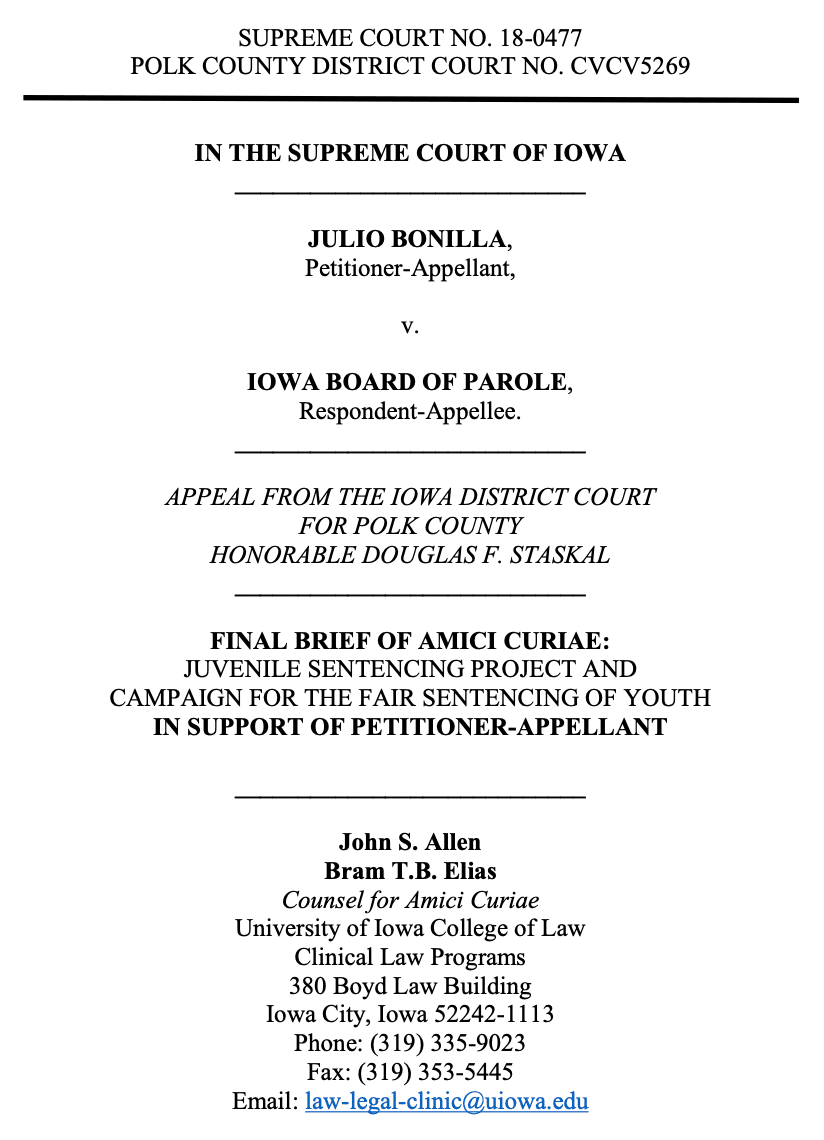
Summary of Argument
Under the U.S. and Iowa Constitutions, the Iowa Board of Parole (“Board”) must provide juvenile offenders sentenced to life-long sentences with a meaningful opportunity for release based on demonstrated maturity and rehabilitation. To meet this standard, the Board must ground its release decision in an assessment of an individual’s rehabilitation and must have in place procedures to ensure that it has full and accurate information necessary to its decision.
In a series of recent decisions, the U.S. Supreme Court has placed Eighth Amendment limits on the sentences that may be imposed on children. Graham v. Florida held that children convicted of nonhomicide offenses cannot be sentenced to life without parole and must instead have a “realistic” and “meaningful opportunity to obtain release based on demonstrated maturity and rehabilitation.” 560 U.S. 48, 74-75, 82 (2010). Miller v. Alabama and Montgomery v. Louisiana establish that children must have this meaningful opportunity for release even in homicide cases—except in the rarest of cases where the sentencer determines, after giving mitigating effect to the characteristics and circumstances of youth, that a child “exhibits such irretrievable depravity that rehabilitation is impossible.” Montgomery, 136 S. Ct. 718, 733 (2016); Miller, 567 U.S. 460, 472-73 (2012). Following Montgomery, this Court held that life-without-parole sentences are unconstitutional for all children under the Iowa Constitution. See State v. Sweet, 879 N.W.2d 811 (Iowa 2016).
Significantly, a sentence may violate the Eighth Amendment and Iowa Constitution even if it technically provides for parole or some other form of early release. Courts have determined that a life-with-parole or similar sentence may run afoul of the Eighth Amendment if the sentence does not provide a chance for release at a meaningful point in time in an individual’s life. See, e.g., People v. Contreras, 411 P.3d 445, 454 (Cal. 2018) (holding that Graham requires more than a de minimis quantum of time outside prison but rather an opportunity to participate as a productive member of society). In addition, even if release is available at a meaningful time, a sentence will not meet constitutional requirements if the criteria and procedures used by the parole board fail to provide a realistic and meaningful opportunity for release based on demonstrated maturity and rehabilitation. See, e.g., Brown v. Precythe, No. 2:17-cv-04082-NKL, 2017 WL 4980872, at *9-*10 (W.D. Mo. Oct. 31, 2017) (denying motion to dismiss challenge to Missouri’s parole system, citing, inter alia, allegations that parole is often denied based on the seriousness of the offense and that hearings focus on the crime rather than maturity and rehabilitation or youth).
Indeed, courts and legislatures across the country now recognize that youth matters to parole—that juvenile offenders are entitled to special consideration and procedural protections to guarantee their constitutional right to a meaningful opportunity for release. To comply with the U.S and Iowa Constitutions, in line with these evolving national standards, the Board must base its release decision on an assessment of a juvenile offender’s maturity and rehabilitation since the time of the crime. Youth must be accounted for—both to set a baseline for measuring post-crime growth and change, and to provide context for behavior before, during, and after the crime. The Board may not deny release based on the severity of the offense or victim impact, as such a decision would be inconsistent with the constitutional mandate to base the release decision on maturity and rehabilitation. Moreover, to provide a meaningful opportunity for release, the Board’s procedures must ensure that it has comprehensive and accurate information so that it can fully and fairly assess a juvenile offender’s maturity and rehabilitation.